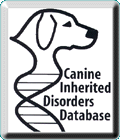
Responsible breeding
Responsible Breeding
Dog breeding is – or should be – a big responsibility. Good breeders are caring and knowledgeable about their breed and they invest significant time, thought and research into planning their breedings. In order to reduce the chance of producing offspring with inherited disorders, good breeders conduct the appropriate screening tests on the dogs they breed. They will also put a great deal of effort into raising and socializing the puppies to prepare them for their new homes.
Breeding to avoid inherited disorders
Breeders should ensure that both breeding bitches and stud dogs are screened and certified clear of inherited disorders. They also need to know as much as possible about any health or genetic disorders in the pedigrees of the dogs they are breeding so they can avoid doubling up on any genetic concerns that may be present in the pedigrees of both parents.
Responsible breeders care about the puppies they produce as well as prospective owners. Because they have done the screening tests and made informed choices on breeding pairs, good breeders sell their puppies with a written health guarantee against the inherited disorders for which they have screened. They will also provide a guarantee of overall health and temperament and they take lifetime responsibility for the puppies they have bred. Good breeders will require the purchaser to sign a contract that outlines the obligations of the breeder as well as requirements of the new owner, such as attending puppy and obedience classes, spaying or neutering and general care of the dog.
How can veterinarians help?
Responsible breeders will work closely with their own veterinarian to ensure the general health, reproductive health and genetic stability of their breeding dogs. Veterinarians use many different techniques to ensure that individual dogs are healthy and free of any genetic defects that may affect puppies. For instance, blood samples are used to check for inherited genetic diseases such as von Willibrand disease and other bleeding disorders, swabs of the mouth lining can be use to screen for degenerative myelopathy, and radiographs are commonly used to assess the structural integrity of hips and elbows. Veterinary specialists may also be needed to certify that breeding dogs are free from inherited eye and cardiac disorders.
Every breed has a number of potential inherited, genetic disorders. Veterinarians and their breeder clients will work to minimize the chance that any affected dog enters the breeding program. The ultimate goal is to place healthy, genetically sound, behaviourally competent puppies in appropriate homes with their new owners.
How to recognize good breeders
Reputable breeders proudly show you their dogs and their facilities, they require you to visit and they have endless questions to screen potential puppy buyers. They want to be sure that your lifestyle, knowledge of dogs and attitude are a good fit for that breed and for a particular puppy. Their puppies are raised in their home (not in a barn or garage or even basement) where they become accustomed to household sounds, such as the phone, dishwasher, noisy pots and pans, the doorbell, oven timer, people coming and going. The pups will also receive lots of human socialization.
A good breeder breeds only one or a select few breeds of dog so that they really know the breed(s). They are a member of that breed club and adhere to the club’s Code of Ethics. They participate in dog shows and possibly other dog sports or events. Good breeders will gladly talk to you about their breeding practices – how often they breed, how old or young they breed their bitches and how they raise their puppies. A responsible breeder doesn’t breed their dogs until they reach sexual and physical maturity and stops breeding by middle age, which will vary depending on the breed.
Good breeders will never sell a puppy or dog without meeting you or having someone else meet you. They will expect you to stay in touch with them, send pictures and keep them informed on the progress of your puppy. They will require you to return the dog to the breeder if at any time and for any reason, you cannot keep the dog.
Stay clear of breeders who don’t ask you anything about yourself, your living situation and lifestyle. Avoid breeders who don’t screen their dogs for genetic disorders, or who won’t show you such health clearance certifications. Do not buy from breeders who are selling unregistered ‘purebreds’ or who charge extra for registration papers.
See also: A Commonsense Guide to Selecting a Dog or Cat

